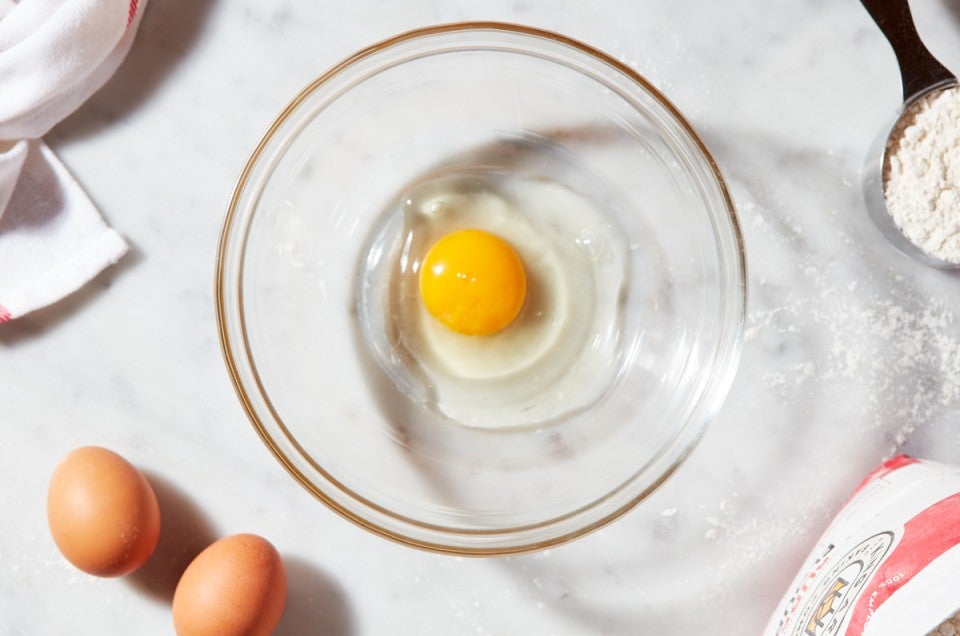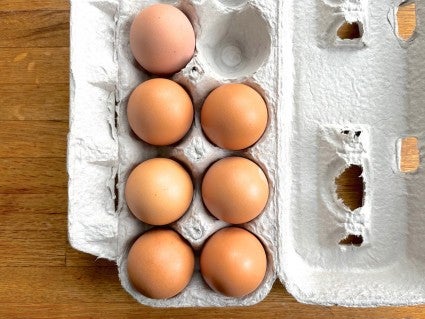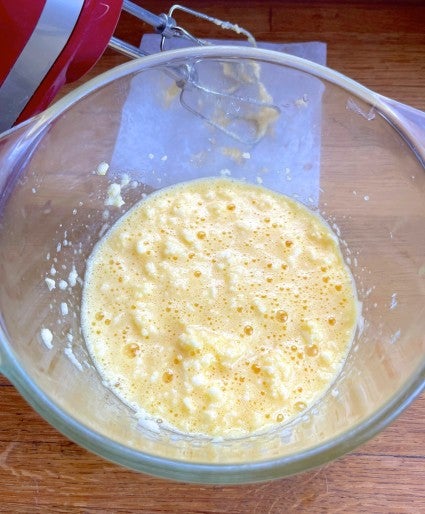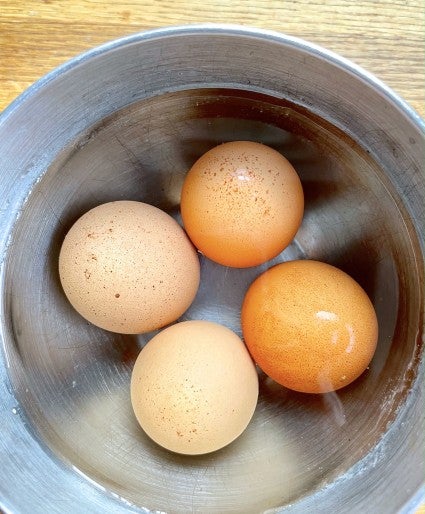Do eggs used in baking really need to be at room temperature?
If the recipe says so, yes. And here’s why.


You have a sudden urge for cake. (We’ve all been there, right?) You figure you have just enough time to throw the batter together and get it into the oven before your next Zoom. You pull out the recipe and — oh, man … It calls for “eggs, at room temperature.” Really? REALLY?

Yes, really. Either choose a non-temperature-dependent cake recipe (our Original Cake Pan Cake is a Hall of Famer) or put off your cake baking. Because when a King Arthur recipe (or any thoughtfully developed recipe) calls for room-temperature eggs — that would be 68°F to 70°F — then room temperature they should be. (And if the recipe doesn't specify temperature? Then either cold or room temp. is typically fine.)
When a cake recipe calls for creaming room-temperature butter and sugar together until light and fluffy then gradually adding room-temperature eggs, you’re creating the foundation for your cake’s structure.
During beating, the combination of sugar crystals and butter creates air bubbles. Adding eggs introduces water (from the whites), which combines with the sugar to create a syrup that fixes itself in suspension around the air bubbles, effectively trapping them. Add your remaining ingredients carefully (you don’t want to “break” that suspension), and you’ll make high-rising cake with a fine crumb.

What happens if the eggs you add are cold? The delicate butter-sugar-air combo you’ve just beaten together is damaged when the cold eggs stiffen the butter into small sharp chunks. This hardened butter rips apart the suspension — and all of a sudden, those air bubbles are gone. Not a good thing; your cake won’t rise as high and its texture will be coarse.
Some cakes start by beating eggs with sugar instead of eggs with butter, but the desired result is the same: trapped air bubbles. Start with cold (read: stiff) eggs, and it’s much more difficult to coax air into the mixture. Room-temperature eggs, being more flexible, capture air more quickly and easily: It’s simple as that.
Cream-method cakes aren’t alone when it comes to using room-temperature eggs for best results. Here are some other instances where you should make sure your eggs are at room temperature before you use them.


Sometimes it simply doesn’t matter what temperature your eggs are: cold, cool, or room temperature. Here are a couple of examples:


According to the FDA, eggs should be left at normal room temperature (68°F to 70°F) no more than two hours; or at higher temperatures no more than one hour.
When you’re set to bake and your recipe calls for room-temperature eggs but all you have is fridge-cold, don’t give up. Here’s how to warm eggs quickly:
Fill a bowl with hot water: think a warm, relaxing bath, not a scalding hot shower. Submerge the cold eggs in the hot water. They should warm to 70°F or so within about 10 minutes.
You know what else can make or break a cake? Having your butter at the right temperature. Check out this article on best practices for creaming butter and sugar.
Cover photo by Rick Holbrook; food styling by Kaitlin Wayne.


January 30, 2022 at 4:44pm
PJ,
Thank you for this great information about the eggs. Now I know why to use room temperature eggs.
January 30, 2022 at 4:32pm
I misread the question at the end of the explanation. Please disregard my answer! I DO plan to use KA flour in the next week!
January 30, 2022 at 3:56pm
Thanks so much for the explanation. I often wondered why and, so, no matter what I baked, I always let my eggs come to room temperature. Nice to know that if I'm in a hurry, I can still bake. Great tips. One question though, my husband usually takes his eggs out at nights when he wants to use them early in the morning. Is this safe for him to do so?
November 3, 2023 at 10:43pm
In reply to Thanks so much for the… by Julie Schauer (not verified)
Yes it is ok to leave the eggs and salted butter out all night (say 10 or 11 pm-set them out on the counter) then the eggs and butter will be at room temperature to make cakes. If the recipe calls for milk in a cake recipe, then let the milk get room temp too. I have been doing this for years! No problems with doing this and my pound cakes taste great!
November 5, 2023 at 9:49am
In reply to Yes it is ok to leave the… by Ivye (not verified)
Hi Iveye, thanks for your comments! While we're glad to hear you've had no problems when leaving your eggs out overnight, we prefer to play it safe and go by the FDA's recommendations: "According to the FDA, eggs should be left at normal room temperature (68°F to 70°F) no more than two hours; or at higher temperatures no more than one hour."
January 30, 2022 at 1:13pm
Great articles! I am going to warm my eggs from now on. I wondered why my cakes sometimes did not raise like they should have.
January 30, 2022 at 12:52pm
Thank you PJ. The information you provide has really helped me improve all my baking efforts! And your articles are such fun to read.
January 29, 2022 at 7:24pm
My daily room temperature is 60 to 62 degrees. Thank you for including an easy solution for warming up the eggs.
January 29, 2022 at 12:39pm
I warm my eggs quickly by placing them inside my bra. Warms them nicely.
July 5, 2023 at 12:28pm
In reply to I warm my eggs quickly by… by Margaret Klein (not verified)
yay Margaret! Way to go... 😂
Pagination